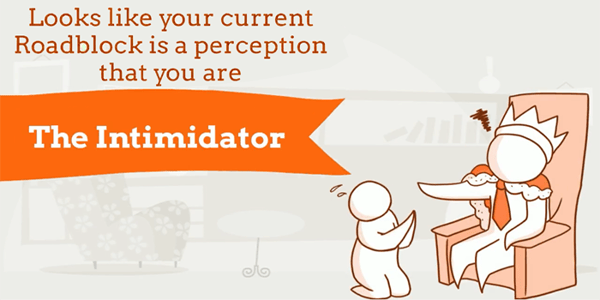Signs of Toxic Leadership Part 5: Are Your Employees Scared of You?
Welcome back to this 12-part series about the personas, career roadblocks and blind spots that, when displayed by leaders, result in low morale and bad work environments.
The series about the warning signs of toxic leadership is meant to be personal. It’s for you to work on you. Not everything will be relevant. But something should be. Over 90% of professionals exhibit some of these behaviors and find themselves stalled in their careers at some point. None of us are immune! Follow the entire series to get information about all the personas.
This week: Do you have scared employees?
Related posts:
- Part 1: The Scrambler
- Part 3: The Climber
- Part 4: The One-Hit Wonder
- Part 6: The High & Mighty
- Part 7: The Lone Wolf
- Part 8: The Nuclear Reactor
- Part 9: The Mouse
- Part 10: The Control Freak
- Part 11: The Artful Dodger
- Part 12: The Rebel
Warning Signs of Toxic Leadership: Are You The Intimidator?
You have a strong opinion, and you are good at asserting your position. You’re direct, determined, and swift to take action. You don’t let problems or people get in your way once you’ve got a goal in your sights. You expect people to yield to your authority or your expertise and, if they don’t, too bad.
Whether real or perceived, you may be seen as The Intimidator who:
-
Plows ahead to get things done without regard for others’ feelings.
-
Thinks and acts quickly and doesn’t give others a chance to catch up and weigh in. Is not seen as being approachable at work.
-
Doesn’t filter messages or feedback but is so direct that others are sometimes taken aback.
-
Shuts down when others disappoint you; lacks empathy for their reactions to you.
-
Values speed and performance over relationships and connections.
In the past, this has served you well or manifested as a positive when:
-
Decisive action and swift implementation were necessary.
-
You needed to proceed with your own agenda despite the impact it might have on others.
-
You were concerned that others might take advantage of you.
-
Getting things done was the top priority.
-
People try hard to please you.
Maybe this persona isn’t who you really are. It’s not who you intend to be. It feels unfair to be labeled this way. Nonetheless, if people see you as The Intimidator, something caused them to see you this way. For your scared employees, this is real.
What Can I Do if I Might Be The Intimidator?
 You can get a visual look at The Intimidator in the video above.
You can get a visual look at The Intimidator in the video above.
Make sure you don't have a blindspot when it comes to your soft skills or style. Take the free, self-paced course called The Essentials of Personal Effectiveness to build transferable skills and improve the quality of workplace interactions.
If you’re encountering a potential blind spot, feel stalled in your career, or are struggling with interpersonal skills in the workplace, you might benefit from working with a certified executive coach. Most senior-level executives have worked with a professional coach at some point in their career. Check out this Forbes article for more about the benefits of coaching.
Ultimately, YOU are responsible and YOU are in control of your choices about how to lead and how to interact with others in the workplace. Now that you’ve got awareness, it’s time to take action.
If you are, indeed, The Intimidator, here are some immediate actions you can take to be less intimidating at work:
-
Take time to evaluate whether your actions are aligned with your intentions.
-
Avoid dominating conversations or signaling impatience with others who are speaking. This is NOT how to get employees to speak up.
-
Slow down instead of making hasty judgments about others’ abilities and contributions.
-
Be more sensitive to how people are reacting as you move fast and become directive.
If you’re wondering whether or not it’s worth it to make these changes, you should know that there is an impact to being perceived as The Intimidator. There’s an impact on people you work with.
There are also consequences for you, including:
-
The biggest risk you take when you allow Intimidator behaviors to go unchecked is that people will be taken aback by you. They will feel badly because of things you’ve said or done, even if you did not mean to make them feel that way. Sometimes your very direct approach isn’t appreciated or understood by others.
-
Over time, you may find that people feel you are unpleasable. As a result, they stop trying to please you. They may become disengaged. Some will try to avoid you. It may be difficult for you to sustain workplace relationships. Maybe you’ve given up on them altogether.
-
You also run the risk of getting limited buy in for your decisions and projects. People will do the work you’ve asked, but they won’t fully support it. They won’t apply additional discretionary effort. Using authority instead of influence often has this unintended consequence.
This choice is yours to stop being intimidating. Choosing to deny, ignore or embrace your Career Roadblock characteristics are all legitimate choices. You don’t have to change a thing.
On the other hand, if these behaviors or perceptions are preventing you from reaching your goals, it’s also a legitimate choice to modify what you’re doing.
Either way, put yourself in control. Be aware of the perception, your choices surrounding that perception, and the impact of being perceived in this way.
How Can I Learn More About This Roadblock (and Others, Too)?
The Intimidator is one of 12 behavior sets that can become career roadblocks. When others are observing the issues with someone who is stuck and has these blind spots, they frequently use terms to describe these roadblocks (e.g. “control freak” or “dinosaur”).
You’ll also get a complete report that describes the career roadblock and offers suggestions for change. It’s all free, a gift from People First Productivity Solutions.
You can learn about all the career roadblocks that lead to toxic leadership by following this blog series.

